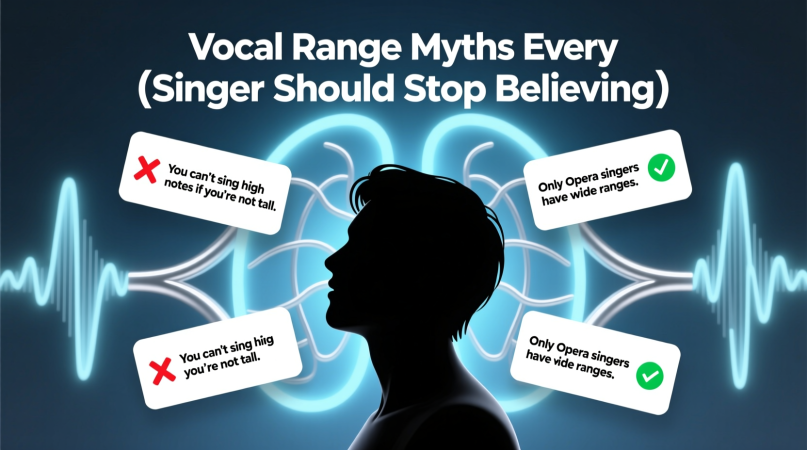
Every singer wants to know how high or low they can go. But along the way, many pick up bad advice or cling to misconceptions about vocal range. These myths can hold you back, cause unnecessary frustration, or even damage your voice. Let’s clear them up so you can focus on what really matters.
Myth 1: A Bigger Vocal Range Means You’re a Better Singer
Some singers believe that unless they can belt out five octaves like Mariah Carey or Axl Rose, they’ll never be impressive.
Truth: Your value as a singer is not measured in octaves. What matters more is control, tone, tessitura (your most comfortable zone), and how you communicate emotion. A two-octave singer with good phrasing can be more moving than someone straining for extra notes.
Myth 2: You’re Born With a Fixed Range
It’s common to hear, “You either have it or you don’t.”
Truth: While genetics set a foundation, training can extend both your high and low notes. With healthy technique, most singers expand by a few notes in each direction. Tools like our Vocal Range Calculator can help you track your growth over time.
Myth 3: Hitting a Note Once Means It’s in Your Range
If you can squeak out a high note once, does that mean it’s yours to claim? Not quite.
Truth: Your range only counts notes you can sing consistently and without strain. If it requires yelling, cracking, or leaves your throat sore, it’s not truly in your range yet.
Myth 4: Chest Voice and Head Voice Are Separate Instruments
Some people describe these as totally different voices.
Truth: They’re registers of the same instrument. Skilled singers blend them into a smooth transition, often called “mix voice.” Developing this blend is what gives you freedom across your range.
Myth 5: Classical Singers Always Have Larger Ranges Than Pop Singers
It’s easy to assume opera singers cover more notes because of their training.
Truth: Classical training often builds 3–4 octaves, but many pop singers also cover wide ranges. Beyoncé, Ariana Grande, and Freddie Mercury prove that genre doesn’t limit potential. It’s about training and vocal style, not the label on your music.
Myth 6: Whistle Register Is Essential
Mariah Carey and Ariana Grande made whistle tones famous, which led many singers to think it’s required.
Truth: Very few singers access whistle register naturally. It’s not necessary for artistry or success. What matters is how well you use the range you do have.
Myth 7: Your Range Won’t Change With Age
Some believe your voice stays locked in once you hit adulthood.
Truth: Age, hormones, and lifestyle can all affect vocal flexibility. With consistent training, you can maintain and even improve your range, but it will evolve over time.
